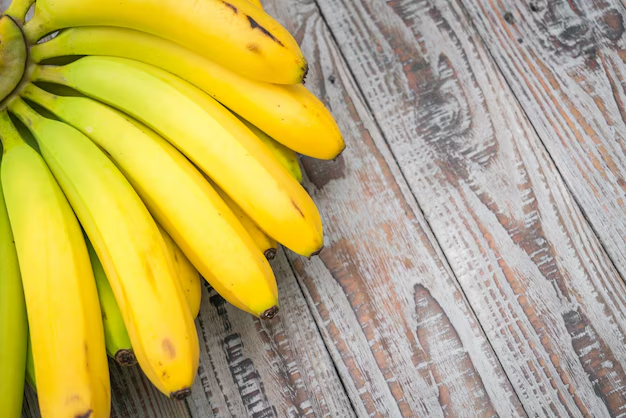Should You Keep Bananas in the Refrigerator? The Great Debate Unpeeled 🍌
Bananas are a staple in many households for their delightful taste, versatility, and health benefits. But what happens when you bring them home and they start ripening too quickly? Should you toss them in the refrigerator to slow down the ripening process, or will that cause more harm than good? Let's dig deeper into this sticky situation and unravel the truth about bananas and refrigeration.
🍌 The Science Behind Banana Ripening
Bananas, like many fruits, undergo a ripening process that's both fascinating and crucial to their flavor development. This process is driven by ethylene, a natural plant hormone that bananas produce in abundance. Ethylene promotes the conversion of starches to sugars, giving ripe bananas their sweet taste.
The Role of Temperature
Temperature plays a significant role in how quickly bananas ripen. Generally, warmer temperatures accelerate the ripening process, while cooler temperatures can slow it down. This is where the refrigerator comes into play—its cooler environment can potentially extend the lifespan of your bananas. However, refrigerating unripe bananas can stop the ripening process altogether, leaving you with chalky, bland fruit.
📦 To Chill or Not to Chill? That is the Question
Pros of Refrigerating Bananas
- Extended Freshness: For bananas that are already ripe, refrigeration can help keep them fresh a little longer. The cold temperature slows down the production of ethylene, thus slowing the ripening.
- Less Waste: By slowing down the over-ripening process, you reduce the likelihood of bananas ending up in the trash.
- Convenient Storage: If you buy bananas in bulk, refrigeration can help stagger the ripening process, allowing you to eat them over several days.
Cons of Refrigerating Bananas
- Skin Discoloration: A common downside of refrigerating bananas is the skin turning brown or black. This might be off-putting but doesn’t necessarily affect the inside of the fruit.
- Texture Changes: Prolonged refrigeration can affect the banana’s texture, making it softer or mushy, which some may find unappealing.
- Flavor Alteration: The flavor of refrigerated bananas can change slightly, causing them to lose some of their aromatic quality.
🥶 Ripe vs. Unripe: Timing Matters
The decision to refrigerate bananas heavily depends on their ripeness at the time you put them in the fridge. Let's take a closer look:
Ripening Off the Vine
For unripe bananas, refrigeration is not recommended. The cold halts the enzymatic processes needed for the bananas to ripen. This means they won't turn sweet or soft, retaining a more chalky and firm texture.
Tip: Keep them at room temperature until they reach your desired ripeness. Once ripened, you can refrigerate them to extend their freshness by a few days.
🍞 Making the Most of Overripe Bananas
Love bananas but fear wasting them once they become too ripe? Here’s how you can prevent waste:
- Banana Bread: Overripe bananas are perfect for banana bread or muffins. The sweetness and texture of overripe bananas make baked goods moist and flavorful.
- Smoothies: Peel and freeze bananas before they become too mushy. Use them in smoothies for a creamy texture and natural sweetness.
- Pancakes: Mash overripe bananas into your pancake batter for a delicious twist.
📊 At a Glance: Refrigeration of Bananas
Here's a quick summary of when it might be beneficial to refrigerate your bananas:
| Bananas | When to Refrigerate | Why |
|---|---|---|
| Unripe | Avoid | Stops the ripening process |
| Ripe | Recommend | Slows over-ripening, extends freshness |
| Overripe | Freeze instead | Use in recipes like bread or smoothies |
🏡 Other Fruits and the Refrigerator Debate
The dilemma with bananas may have you wondering about other fruits. Here’s a brief overview of common fruits and their refrigeration status:
- Apples: Can be refrigerated to maintain crispness longer.
- Berries: Best kept refrigerated to extend shelf life.
- Avocados: Ripen at room temperature, refrigerate once ripe.
- Citrus Fruits: Usually fine out of the fridge, but last longer when refrigerated.
🍽️ Practical Tips for Banana Lovers
- Use a Fruit Bowl: Keep bananas away from other ethylene-sensitive fruits to prevent premature ripening.
- Banana Hanger: Using a banana hanger helps improve air circulation and reduces bruising.
- Separate and Conquer: Breaking a bunch into individual bananas can sometimes slow down the ripening process.
🍏 Embracing Imperfection
Remember, a banana's worth isn't just skin-deep. Even if the peel turns brown, the fruit inside is often still good to eat. In fact, a blackened peel indicates a sweetness perfect for baking or treating yourself to a naturally sweet dessert!
🍽️ Summary of Key Takeaways
- 🍌 Unripe bananas should stay at room temperature to ripen properly.
- 🥶 Ripe bananas can be refrigerated to prolong freshness.
- 🧊 Overripe bananas are best frozen for smoothies or used in baking.
- Avoid mixing bananas with other ethylene-producing fruits to slow ripening.
- Keep bananas on a hanger or in separate bunches for optimal freshness.
Whether or not to refrigerate your bananas depends on your personal preference and the ripeness of the fruit. By understanding the science behind ripening and considering practical storage tips, you can make the most of every banana. Keep experimenting with what works best for you, and enjoy the delightful versatility this fruit offers in your daily diet!

